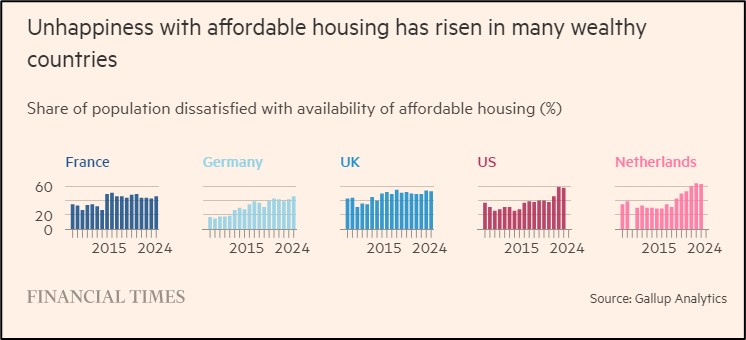Daily Comment (September 3, 2024)
by Patrick Fearon-Hernandez, CFA, and Thomas Wash
[Posted: 9:30 AM ET] | PDF
Our Comment today opens with a global poll showing that dissatisfaction with high home prices and rental rates is now widespread across the developed world, although it’s unclear whether that will spur lower interest rates or increased homebuilding to improve affordability. We next review several other international and US developments with the potential to affect the financial markets today, including more dangerous interactions between Chinese and Philippine ships in the South China Sea and a statement by Vice President Harris that she opposes the takeover of US Steel by a Japanese steel manufacturer.
Global Housing Market: While it’s tempting to think only people in the US are mad about high home prices and rising rents, new research from Gallup shows voters are dissatisfied across the developed world. Indeed, the population-weighted average rate of dissatisfaction in the countries of the Organization for Economic Cooperation and Development now stands at about 50%. OECD economists tag the shortfall to both high interest rates and insufficient homebuilding, especially at lower price points, which has boosted home prices and rents.
European Union: The European Court of Justice today ruled that the EU’s competition regulator exceeded its authority when it blocked US gene-sequencing firm Illumina’s takeover of cancer-test maker Grail. According to the court, the regulator had no jurisdiction to review the case, and the legal tool it used to block the merger was used improperly.
- The ruling is a blow to the EU’s strategy of blocking so-called “killer acquisitions,” where a firm buys a much smaller player to eliminate a source of potential competition, even if the target currently has little or no EU revenue.
- The aggressive EU strategy has been one bone of contention between EU regulators and powerful technology-oriented companies in the US.
Germany: In state elections on Sunday, the anti-immigrant, far-right populist Alternative for Germany (AfD) came in first in the eastern German state of Thuringia and second in Saxony. The results mark the best showing for a far-right party in Germany since the Nazi period in World War II. It appears that a new populist-left party, the Sahra Wagenknecht Alliance (BSW), will finish third in both states, potentially making it a kingmaker.
- AfD’s strong performance points to continued gains by the far right in the European Union, raising concerns about political stability in the bloc and its prospects for staying intact.
- More generally, the rise of some far-left parties in Europe point to worsening polarization, which will make it even harder for EU leaders to keep the bloc together, formulate policy, and support the economy and financial markets.
Switzerland: In a shocking report late last week, a panel of diplomats, high-level government officials, and military officers told the government that it should consider abandoning the country’s vaunted neutrality policy, which has been in place since 1515. Faced with Russia’s growing aggression, the report says Switzerland should consider developing the capability to work with the European Union and the US in defense matters. It also recommends that Switzerland end or revise its ban on selling weapons to countries at war.
China-Philippines: Over the weekend, a Chinese coast guard vessel once again harassed a Philippine coast guard ship in disputed waters in the South China Sea. To be precise, multiple Chinese vessels surrounded BRP Teresa Magbanua near Sabina Shoal, and one repeatedly rammed her. We have also seen reports that the Philippine ship has now turned off her location transponder, either deliberately because she is trying to hide from the Chinese, or perhaps because she has been boarded and taken over by the Chinese.
- China’s continual harassment of Philippine ships, including multiple instances of ramming and other physical contact, suggest the territorial disputes in the South China Sea will continue to present a risk of broader conflict.
- As we have noted previously, the US and the Philippines have a mutual defense treaty, and Manila has implied that if a Philippine sailor is killed in a conflict with China, it might turn to the US to help defend it.
China-Canada: Beijing today said it will investigate whether Canada is dumping canola on the Chinese market at predatory prices. The anti-dumping probe is almost certainly in retaliation for Ottawa’s decision last week to impose anti-dumping tariffs on Chinese steel, aluminum, and electric vehicles. The new probe by China is the latest sign of a possible global trade war as Beijing tries to boost economic growth by flooding the world with its exports and major developed and emerging countries erect trade barriers to protect their workers.
United States-South Korea-China: As the Biden administration continues trying to cajole US allies into clamping down further on selling advanced semiconductor technology to China, the South Korean trade minister yesterday said Washington should provide incentives for Seoul to play along. The statement reflects some allies’ resistance to losing lucrative trade flows with China, even as many business leaders in the US and the rest of the US-led geopolitical bloc resist giving up on the Chinese market.
US Economic Policy: Illustrating how nationalist populism has been embraced by both major political parties, Democratic Vice President Harris yesterday said she would oppose Japanese steelmaker Nippon Steel’s pending takeover of US Steel. Harris’s opposition to the deal, made at a union hall in Pittsburgh as part of her presidential campaign, echoes the opposition from President Biden, former President Trump, and other Republican and Democratic lawmakers.
- As we’ve noted before, populist policies are likely to be reflected in the major policies put into place whether Trump or Harris wins the presidential election in November.
- Those policies are likely to include more trade barriers and protectionism, more industrial policy to favor certain domestic industries, and tax cuts and benefit programs for the working class. Of course, the specific policies pushed by Trump or Harris would be different, but many will probably be geared to addressing today’s populist sentiment.



